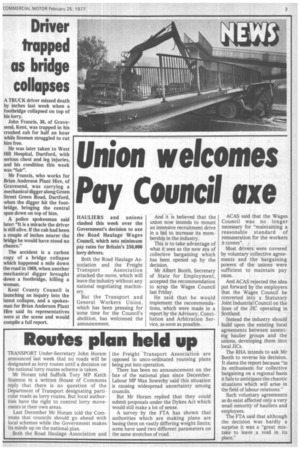Mon welcomes Pay Council axe
Page 5

If you've noticed an error in this article please click here to report it so we can fix it.
HAULIERS and unions clashed this week over the Government's decision to axe the Road Haulage Wages Council, which sets minimum pay rates for Britain's 250,000 lorry drivers.
Both the Road Haulage Association and the Freight Transport Association attacked the move, which will leave the industry without any national negotiating machinery.
But the Transport and General Workers Union, which has been pressing for some time for the Council's abolition, has welcomed the announcement. And it isbelieved that the union now intends to mount an intensive recruitment drive in a bid to increase its membership in the industry.
This is to take advantage of what it sees as the new era of collective bargaining which has been opened up by the decision.
Mr Albert Booth, Secretary of State for Employment, accepted the recommendation to scrap the Wages Council last Friday.
He said that he would implement the recommendations, which were made in a report by the Advisory, Conciliation and Arbitration Service, as soon as possible. ACAS said that the Wages Council was no longer necessary for "maintaining a reasonable standard of remuneration for the workers it covers".
Most drivers were covered by voluntary collective agreements and the bargaining powers of the unions were sufficient to maintain pay rates.
And ACAS rejected the idea put forward by the employers that the Wages Council be converted into a Statutory Joint Industrial Council on the lines of the JIC operating in Scotland.
Instead the industry should build upon the existing local agreements between assenting haulier groups and the unions, developing them into local JICs.
The RHA intends to ask Mr Booth to reverse his decision. It slams the report because "in its enthusiasm for collective bargaining on a regional basis it fails to anticipate the chaotic situations which will arise in the field of labour relations."
Such voluntary agreements as do exist affected only a very small minority of hauliers and employees.
The FTA said that although the decision was hardly a surprise it was a "great mistake to leave a void in its place."






























































































